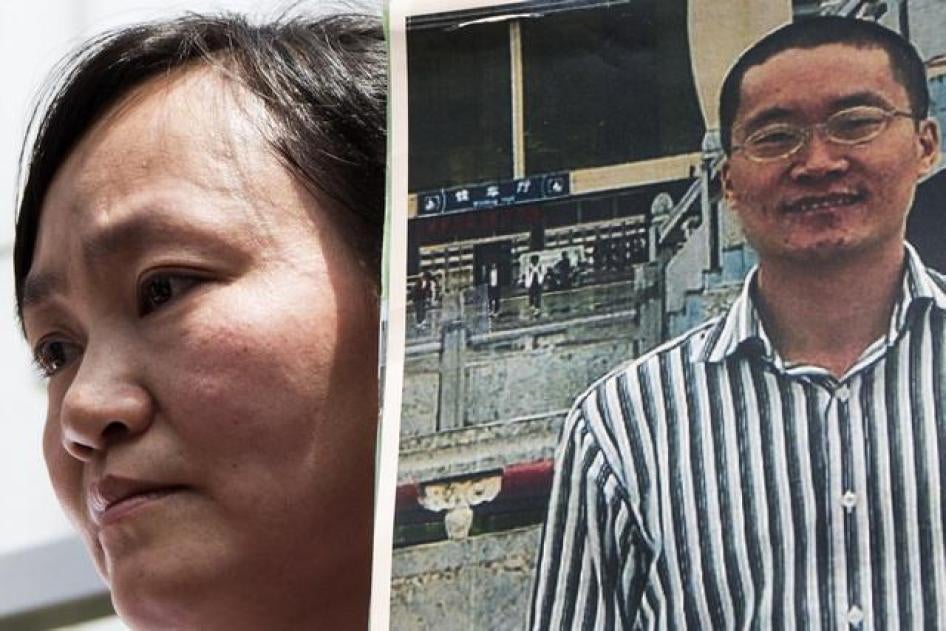“If you knew 12 years ago, when you took up your first human rights case, that your beloved daughter would be barred [from school as a result], would you still do it?... I know you would!”
Wang Xiaoling, the wife of Chinese human rights lawyer Li Heping, wrote this to her husband in a moving public letter issued in May 2016. Li is one of 11 lawyers and legal assistants whom Chinese authorities have recently charged with subversion in retaliation for their legal advocacy. After Li was detained in July 2015, his family endured months without information about his whereabouts or wellbeing. Wang’s quest for information about her husband’s fate has repeatedly landed her in detention for brief periods.
Wang and Li are not alone in their ordeal. Since the government detained two dozen human rights lawyers and activists in a July 2015 sweep, their spouses, children and other family members have suffered from not knowing where their relatives are, how they are being treated, and when – and for what – they might be prosecuted. The authorities have also forced families out of their homes, denied them education opportunities, barred them from travelling abroad and put them under smothering surveillance. These totalitarian tactics seem designed to punish not only the detainees but also their families, in order to deter others from taking up human rights work.
Yuan Shanshan, the wife of lawyer Xie Yanyi, was detained for three days, despite having committed no crime. All she did was to seek the authorities’ approval for Xie to attend the funeral of his mother, who had died while he was in detention. Although Yuan was pregnant, she was given very little food and water, denied toilet breaks, and threatened and scolded by more than two dozen police officers in an interrogation room during her detentions.
After police took lawyer Wang Quanzhang away in July 2015, they confiscated Wang’s bank cards, leaving his wife Li Wenzu struggling financially. They then pressured Wang’s parents and sister to go on videotape to convince Wang to confess. Wang’s family remain under round-the-clock surveillance.
Some of the government’s targets are very young children. Beijing lawyer Li Heping’s 6-year-old daughter was refused entry to an acclaimed primary school because police would not grant her the residency permit she needed to enroll. The authorities also denied her and her 15-year-old brother passports, which would allow them to leave the country, claiming they were “state security threats.” In another case, authorities confiscated the passport of Bao Mengmeng, the teenage son of detained lawyers Wang Yu and Bao Longjun, preventing him from pursuing studies in Australia. After he fled to Burma, he was snatched – presumably by mainland agents – and has since been detained under house arrest. Altogether, six children of lawyers have been barred from travelling abroad, many who want to leave to pursue education opportunities and escape harassment at home.
Chinese authorities have also employed eviction as a tactic. In July 2016, Yuan Shanshan and her three children were forced out of their rental home after the landlord began receiving threats from the police. A day after Yuan moved into her new home, the new landlord told her to move again, citing “authorities’ pressure.” Police harassment extends not only to families of detained lawyers, but also to families of the lawyers representing those who have been detained. The wife of lawyer Ren Quanniu, who represented detained legal assistant Zhao Wei, was told to leave their home in July with their two young children.
Earlier this month, a court in Tianjin handed down harsh sentences to four lawyers and activists in the first of patently sham trials of the remaining detainees, suggesting that these families’ ordeals are far from over.
Despite the pressures, the families have not stayed silent. Several lawyers’ wives have courageously banded together and organized numerous protests against their husbands’ detentions, argued with the police about blatant violations of the law and issued public letters demanding their husbands’ release. Even with the new convictions, it’s unlikely that they are going to back down.
Li Wenzu told the media that before the crackdown she “was constantly worried and … felt hopeless.” Now, she says, “I feel I’m a useful person who can think what I can do for other [victims].… The crackdown has changed me.”
Beijing may find that its collective punishment of detainees’ families has not crushed peaceful dissent, but has instead inspired a new generation of activists.










